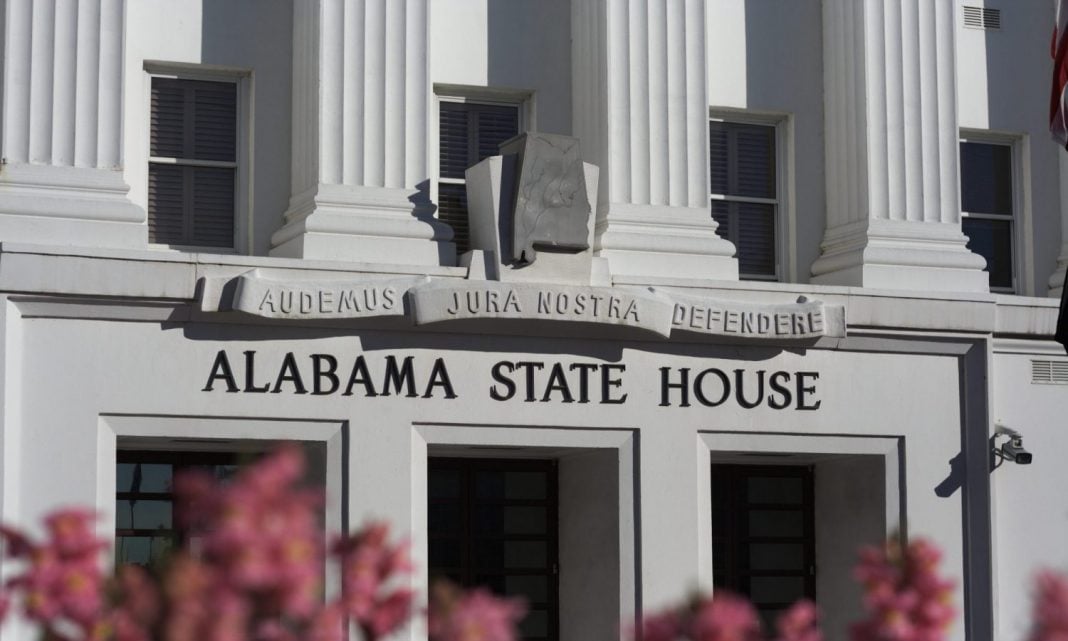_______________________________________________________________________
Thursday April 7, 2022 the Alabama Legislature adjourned sine die from its 2022 legislative session.
The Alabama Legislature Thursday gave final approval to a bill that would attempt to nullify executive presidential orders on guns. The legislation was later signed into law by Gov. Kay Ivey.
The bill, likely to run afoul of the Supremacy Clause in the U.S. Constitution, would prohibit officials and employees of state government from enforcing a presidential order that “limits or restricts the ownership, use, or possession of firearms, ammunition, or firearm accessories by law-abiding citizens of the state.”
Democrats in both chambers said the bill could not be enforced.
“State law can’t supersede federal law,” said Rep. Merika Coleman, D-Pleasant Grove. “So if that is the case, this piece of legislation is not worth the weight of the paper that it is written on.”

Governor Kay Ivey on Tuesday signed Senate Bill 171, the Alabama Numeracy Act, into law. The Numeracy Act, sponsored by Sen. Arthur Orr (R – SD3) and Rep. Alan Baker (R – HD66), is a strategic approach to improving mathematics achievement. In 2019, Governor Ivey and the State Board of Education eliminated Common Core from Alabama’s mathematics standards, and with the governor’s signature, this legislation eradicates these standards once and for all. Upon signing SB171, Governor Ivey issued the following statement:
“Literacy and numeracy are the blocking and tackling of education, plain and simple. For our students to have positive educational outcomes and to have success later in life, we must ensure proficiency in both reading and math is achieved. That is why, here in Alabama, we are focusing on what matters, and that is core instruction – not any of the other nonsense. Alabama parents wholeheartedly agree with that.
“We cannot accept passing our students along without the proper foundation as the status quo, and that is why I have proudly signed the Alabama Numeracy Act into law. This strategic, targeted and wise investment in our children will provide necessary resources, will include high-quality instruction and will keep our schools accountable. The Alabama Numeracy Act delivers on my commitment to place the same sense of urgency on math as we rightfully have on reading.
“Students will not only understand how to find an answer, but will have the mathematical reasoning needed for the in-demand STEM jobs in Alabama.”
Ivey has also signed other controversial bills concerning LGBQT rights and the use of public restroom facilities. This legislation is receiving the expected criticisms and support from disparate factions including drawing the attention of the Biden administration.
Critics have dubbed the legislative package, which includes an amendment to the bathroom bill modeled after Florida’s controversial “Don’t Say Gay” law, which bars instruction on gender identity and sexual orientation in Kindergarten through fifth grade, as “anti-LGBTQ.”
Ivey was among supporters of the bill who said “Don’t Say Gay” is a misnomer.
“Let me be clear to the media and opponents who like to incorrectly dub this the ‘Don’t Say Gay’ amendment: That is misleading, false and just plain wrong,” the governor said in a statement after signing both bills. “We don’t need to be teaching young children about sex. We are talking about 5-year-olds for crying out loud. We need to focus on what matters – core instruction like reading and math.”
 Alabama Republican Party Chairman John Wahl released the following statement following the end of the 2022 Legislative Session:
Alabama Republican Party Chairman John Wahl released the following statement following the end of the 2022 Legislative Session:
“The Alabama Republican Party would like to thank our members in the State House and Senate for their service to the people of Alabama. No legislative session is perfect, but we are proud of our Legislators’ work, leadership and sacrifice this session. They passed solid, Conservative legislation on issues Alabama voters wanted addressed: $160 million in tax relief for the hard working people of Alabama, Constitutional Carry, establishing gender rules for school bathrooms, family leave for adoptive parents, prohibiting the teaching of age-inappropriate material to elementary school children, and the Sergeant Nick Risner Act, which will prevent criminals convicted of a crime resulting in a death from being eligible for early release. Protecting people’s rights, values and safety should always be a priority for government at any level, and that is exactly what these bills did.
“Concerning the threats to our legislature over the Vulnerable Child Compassion and Protection Act during Jen Psaki’s White House Press Briefing yesterday, we want to let our members know the Alabama Republican Party has your back. Alabamians are tired of the Biden Administration’s radical leftist agenda and overreach into our state affairs. Our message to the Biden Administration is to respect the 10th Amendment of the United States Constitution, and keep your nose out of our business.
“On behalf of the ALGOP, I extend a special thank you to Rep. Wes Allen, Rep. Scott Stadthagen, Sen. Shay Shelnutt, and Sen. Garlan Gudger for defending family values, even under fire from the left.”

Bibb County representative Russell Bedsole (HR-49) had this to say about the legislative session:
“Personally, I am very proud that I was able to pass legislation that will give a State income tax credit to our hard working professional volunteer firefighters who serve District 49 and all across the State.”
“While there were some very important issues that did not get addressed in this Legislative session, the Republicans of the Alabama Legislature did some very fine work. From tackling very important issues like the stopping of the harmful practice of giving puberty blocking medication to our youth, to passing legislation that will limit the enforcement of any unconstitutional presidential executive orders that would interfere with Alabamians 2nd Amendment rights. “
“I am proud to stand with my fellow Republicans in having the intestinal fortitude to tackle these hard issues even in an election year. I look forward to many years of continuing to make the state of Alabama and even better place to call home.”

State Senator April Weaver summarized the work of the Alabama Senate with the following list of accomplishments which she said benefitted her entire district, including Bibb County:
American Rescue Plan Act (ARPA) funding:
The legislature made a $772 million investment in communities across the state that will impact Alabamians for generations to come. This piece of legislation appropriates funds made possible through ARPA, passed by Congress in 2021 to assist with the challenges brought upon by the Covid-19 pandemic, for health
care, broadband, infrastructure, the unemployment insurance trust fund,
telemedicine, rural hospitals, county reimbursements, and volunteer fire
departments/EMS.
Broadband expansion legislation:
Leaders in Alabama continue to work
together to address the lack of high-speed internet access across the state.
The legislature passed three bills to modify Alabama’s broadband
expansion process including a proposed constitutional amendment that, if
approved by Alabama voters, would allow a state, county, or municipality
to grant federal award funds or any other source of funding designated for
broadband infrastructure to any public or private entity for the purpose of
providing or expanding broadband infrastructure.
Tax cuts and exemptions:
The Senate passed a tax cut package consisting
of several bills to keep money in the pockets of taxpayers and small
businesses. Among these bills is an exemption from an additional $87.7
million state income tax for working Alabama families on certain expanded
tax credits included in federal Covid-19 relief.Another piece of legislation allows $6,000 of taxable retirement income to be exempt from state income tax for individuals who are 65 years of age or older and provides tax cuts for low-income Alabamians and retirees.
Small business assistance:
Small businesses took a major hit over the last
two years, and the pandemic substantially hindered growth and job
creation for these enterprises. Lawmakers have made a great effort
throughout that time to provide these businesses with the much-needed
relief they deserve. The Small Business Relief and Revitalization Act, part of
the tax cut package, provides several significant relief provisions for
Alabama taxpayers, small businesses, and farmers.
Additionally, the legislature passed a bill to eliminate the $100 minimum
state business privilege tax levied on certain corporations, business trusts,
limited liability entities, and disregarded entities, resulting in a $23 million
tax cut for over 230,000 small businesses.
Historic Budgets:
Both the General Fund and Education Trust Fund budgets
are the largest in the state’s history. Totaling $2.70 billion, the GF budget
repays borrowed funds to the Alabama Trust Fund, increases funding for
mental health including two additional crisis diversion centers, provides for
a cost-of-living adjustment for state employees, and sends money back to
Alabama taxpayers.
The ETF, totaling $8.26 billion, provides substantial funding to address the
demand to recruit and retain educators in Alabama by providing record pay
increases and opportunities to address several critical needs across the
state to better Alabama’s education standing.
Military bills:
A key mission of the Senate during recent years has been to
provide ample support for Alabama’s extended defense, aerospace, and
intelligence communities. Governor Ivey signed a legislative military
package passed by the legislature to ensure Alabama remains the nation’s
most attractive and friendliest state for active-duty military, their families,
and veterans.
These bills ease the process of relocation for military families, make it
easier to find work upon relocating, aid them in the most unfortunate of
times, and create the Space National Guard within the Alabama National
Guard.
- Second Amendment Protections:
The legislature passed legislation to
defend the Second Amendment rights of Alabamians, including
Constitutional Carry and the Second Amendment Protection Act. Alabama’s
Constitutional Carry law allows law-abiding individuals to carry a handgun
for personal protection without paying a tax or obtaining a license from the
state, preserving their fundamental Second Amendment right to protect
themselves, their loved ones, and their homes.
The Second Amendment Protection Act protects Alabamians against any
unnecessary federal overreach and places a ban on the use of certain public
funds, state agencies, and political subdivisions to enforce any federal act,
law, order, rule, or regulation relating to firearms, firearm accessories, or
ammunition.
- Support for Alabama’s Farmers:
Agriculture is one of Alabama’s top
producing industries, accounting for more than 20 percent of jobs in the
state. The legislature passed the Farm Package to enhance Alabama’s
agriculture industry and support farmers and producers across the state.
This package of legislation will protect and empower family farms,
stimulate local economies, eliminate inconsistencies in existing law, and
designate the peanut as the state’s official legume.
- Securing Alabama’s Elections:
The Senate and House passed legislation to safeguard the security and integrity of Alabama’s elections, including bills to prohibit private companies from funding election-related activities. This will prohibit public officials and employees from expending public funds on activities advocating in favor of or against a statewide or local ballot measure and from the improper use of public property for political
activities.
Countless Alabamians have voiced their concerns for the safety and fairness
of our elections, and the legislature continues to propose meaningful
solutions to prevent various forms of election fraud from occurring in the
state.
- Improvements for Education:
The Alabama Numeracy Act provides for
further improved mathematics instruction in public schools and a means for
increasing grade level proficiency in mathematics for students in grades K-5
by establishing summer learning programs, assessment tests, accountability
standards for teachers and principals, and additional training and standards
for teacher education programs.

















